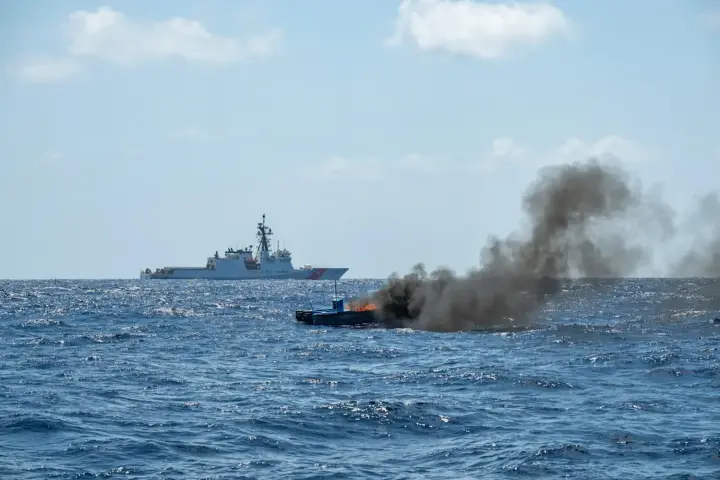Two survivors from a deadly U.S. military strike on a suspected drug-trafficking vessel in the Caribbean Sea are being sent to their home countries rather than facing long-term military detention, according to new reports.
The survivors, who were aboard a semi-submersible vessel when it was struck on Thursday, are being repatriated to Colombia and Ecuador, four U.S. officials told Reuters. Two other crew members were killed in the attack, which President Trump confirmed was part of his administration’s broader military campaign against Venezuelan-linked drug trafficking operations.
“We attacked a submarine,” Mr. Trump told reporters Friday, describing the vessel as designed to transport “massive amounts” of drugs. “Just so you understand. This was not an innocent group of people. I don’t know too many people that have submarines. That was an attack on a drug-carrying, loaded-up submarine.”
The U.S. military conducted a helicopter rescue operation to extract the survivors following the strike, subsequently transporting them to a Navy warship in the Caribbean where they remained detained until at least Friday evening.
The decision to repatriate the survivors avoids complex legal questions surrounding military detention of suspected drug traffickers, whose alleged crimes don’t fall clearly under laws of war, legal experts told the New York Times.
This incident represents the latest move in Mr. Trump’s military buildup in the Caribbean, which includes approximately 10,000 U.S. troops deployed to Latin America this year. The force includes eight Navy ships, guided missile destroyers, F-35 fighter jets, a nuclear submarine, and MQ-9 Reaper drones.
Since September 2, the Trump administration has ordered military strikes on at least six boats in the Caribbean Sea, asserting that they were carrying drugs to the United States. The military campaign has claimed at least 27 lives, according to the Trump administration, prompting Democratic lawmakers to question whether the operations adhere to international laws of war.
The commander in charge of American military operations in the region, Admiral Alvin Holsey, announced this week he is retiring on December 12, two years before his tenure as SOUTHCOM commander would have expired. No explanation was offered.
In a dramatic show of force on Wednesday, three B-52 bombers took off from Barksdale Air Force Base in Louisiana and flew for hours near Venezuela’s coast. The B-52 is a long-range heavy bomber capable of carrying nuclear weapons and has been used in conventional warfare in Iraq and Syria.
The military operations coincide with Mr. Trump’s broader strategy against Venezuela. Earlier this week, the president disclosed that he had authorized the CIA to conduct covert operations inside Venezuela, adding to speculation that the United States is attempting to topple Mr. Maduro’s government.
A source close to the White House confirmed to The New York Sun this week that the campaign is intended to bring down Mr. Maduro. “He had the chance to leave of his own volition. He refused and now will face the consequences,” the source said.
Venezuelan officials have strongly denounced the military buildup and strikes. Foreign Ministry representatives characterized the lethal attacks on Caribbean vessels as “a policy of aggression, threats and harassment against Venezuela,” Reuters reported.
Mr. Maduro has denied any connection to drug smuggling and portrayed the U.S. boat strikes as a pretext for regime change, calling them violations of sovereignty and international law.
In a letter to the United Nations Security Council seen by Reuters, Venezuela’s U.N. Ambassador Samuel Moncada requested a U.N. determination that the U.S. strikes are illegal and asked for a statement supporting Venezuela’s sovereignty.
https://www.nysun.com/article/trump-to-transfer-caribbean-strike-survivors-to-home-countries-rather-than-hold-them-in-pow-style-detention


